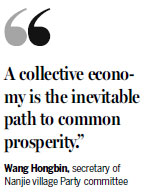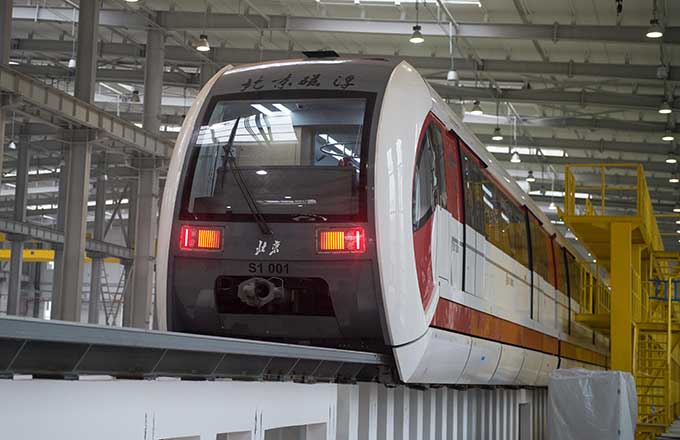Village holds true to communist dream
Nanjie chief credits collective economy, strong leadership for 2 billion yuan in sales revenue
Wang Hongbin, 65, has an astonishing ambition: To build a communist community that distributes goods and services according to one's needs, a goal of communism once proposed by Karl Marx.
Wang, secretary of Nanjie village Party committee since 1977, has every intention of turning his dream into a reality.
A 16-story apartment building stands in the corner of his village in Central China's Henan province. It cost 200 million yuan ($29 million) to construct, and work on the interior is expected to begin next year. It should be completed in 2018.
"If you want to move into the 'proletarian apartments', all you have to do is hand over everything you own," Wang said.
The building can accommodate 800 villagers, and a round-the-clock canteen will provide all the food the residents need. Clothes, shoes, cosmetics and even jewelry will be shared, after sterilization.
"We will choose top brands and meet everyone's personal needs," said Wang, who has plans to accommodate all of Nanjie's 3,700 villagers within 10 years.

In many ways, Nanjie is more like an industrial park than a village. Most young people in China cannot wait to get away from home and work in cities, but here 26 village businesses employ everyone who wants a job.
The village has just 33 hectares of arable land, nowhere near enough to feed the villagers. Only 21 people work on the plots dotted among factories.
Since the 1980s, Nanjie's wealth has come from food processing: beer, chocolate, flour, instant noodles, liquor, medicine and spices. The village raked in 2 billion yuan last year, 150 million yuan of which was profit.
Wang attributes the success to a collective economy and strong leadership, inspired by Mao Zedong, leading founder of the People's Republic of China. Monday marked the 123rd anniversary of Mao's birth.
At a symposium marking the 120th anniversary in December 2013, President Xi Jinping said the Communist Party of China will hold high the banner of Mao Zedong Thought forever in pursuing the Chinese nation's rejuvenation.
Xi said Party members should adhere to and make good use of the "living soul" of Mao Zedong Thought, namely seeking truth from facts, the "mass line" and independence.
Mao's legacy
It is hard to find another village in China quite like Nanjie where Mao's principles of morality and collectivism live on.
Here, people still wake to loudspeakers blaring The East is Red, a classic anthem of the 1960s. Mao's quotations appear on factory walls, in schools, shops and hotels, reminding people to sacrifice their personal interests for the benefit of the collective. Portraits of Mao hang in almost every living room.
In the village square, a 9-meter-tall white marble statue of the great helmsman is flanked by portraits of Marx, Friedrich Engels, Vladimir Lenin and Joseph Stalin. A banner flutters over the statue, unambiguously declaring, "Mao Zedong Thought shines over us forever".
In the early 1980s, like the rest of rural China, Nanjie dismantled communes and began to open up. Collective land was distributed among households and collective factories were contracted to individuals. It was not long before bankruptcy was the order of the day.
The village committee took over two factories in 1984, and by 1986, Nanjie had re-collectivized all its farmland, expanded its industries and it began taking care of its residents.
Prosperity brought with it free water and electricity, then coal, gas, meat, eggs, flour and finally, education.
By the early 1990s, the village welfare system was complete. Even taxes and medical expenses were paid collectively.
In 1991, Nanjie became the first village in Henan with sales revenue of 100 million yuan and the number of enterprises in the village grew to 19.
"A collective economy is the inevitable path to common prosperity and the basis of solving sannong (farmers, villages and agriculture) problems," Wang said.
He believes Mao's greatest legacy in today's Nanjie is the socialist path to common prosperity, which conforms to the current government goal of building a well-off society by the end of 2020.
A collective economy can benefit from opening-up and market reform, and Nanjie, a village with no special resources or talent, is a model for other villages on their march toward prosperity, according to Wang.
While Nanjie is not alone in its collective economy, its distribution of wealth is unique. Huaxi village in East China's Jiangsu province has a strong steel and textile industry. There, gold bullion is distributed to villagers, making everyone a millionaire. In Nanjie, Wang and more than 300 villagers, mostly cadres and factory managers, receive a monthly salary of only 250 yuan, hardly enough for a family meal in Beijing or Shanghai. Most factory workers get 2,000 yuan.
Their incomes consist of 30 percent cash and 70 percent benefits. Wang plans to gradually reduce the amount of cash and increase the welfare.
"Ultimately and inevitably, we will root out private ownership and distribute goods according to individual needs," Wang said. "Enthusiasm inspired by cash will wither away. Strong philosophical commitment is the key."
Whose utopia?
Ding Xiaohui has worked in Nanjie's noodle factory since 2008. She dreams of being an "honorary villager", but the village stopped granting such titles in 2003. Ding earns 2,000 yuan a month, but enjoys none of the free food, accommodation or other niceties that the Nanjie locals have.
"Exploitation of workers from other villages is reasonable during the transition from collective capitalism to communism," Wang said, adding that he is confident that the work of building a communist community will be completed in his lifetime.
His wife works in the laundry room of the village hotel and is a staunch supporter of her husband. Their three children, two daughters and a son, work as civil servants in the cities of Zhengzhou and Luohe.
"They neither discuss nor support nor oppose my cause," Wang said.
Xinhua
|
Nanjie village is being built into a communist community by Wang Hongbin, right, secretary of Nanjie village Party committee since 1977. Cao Kai / Xinhua |


























